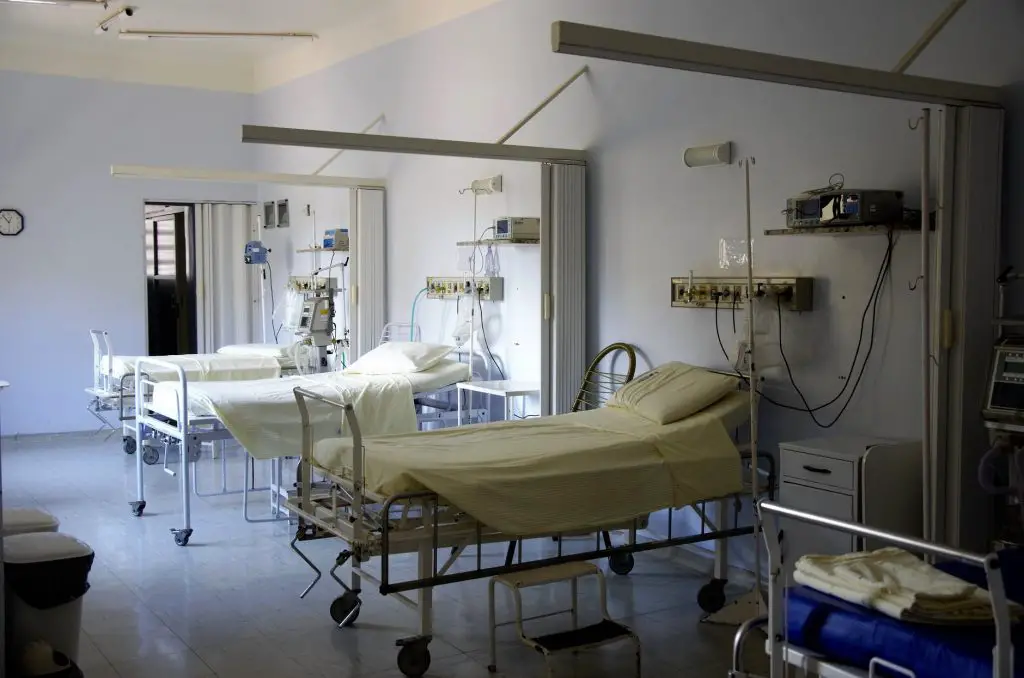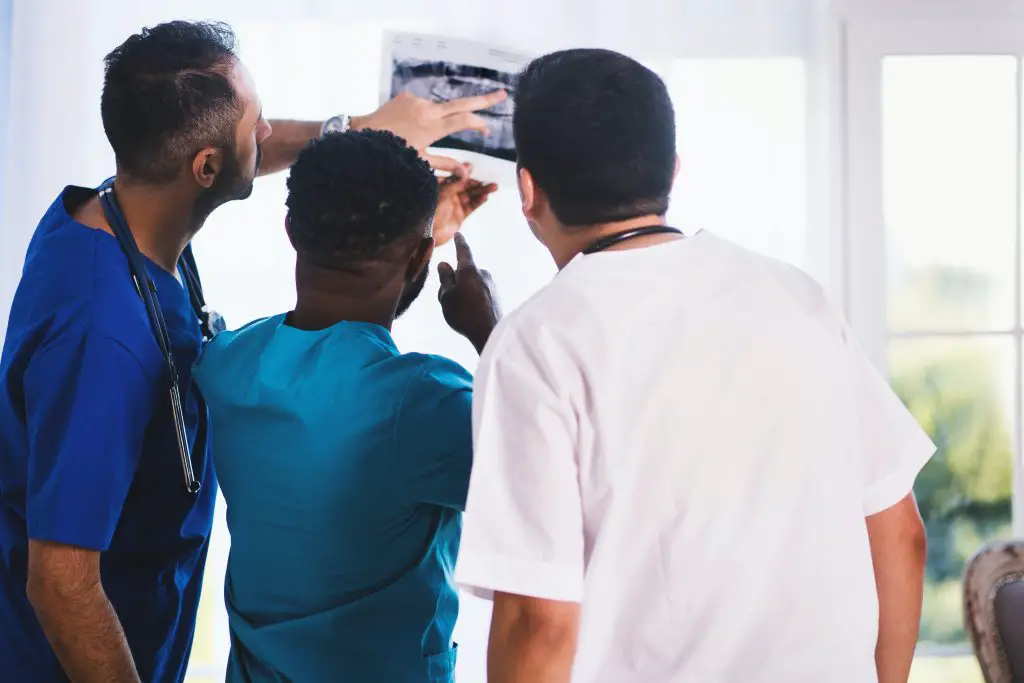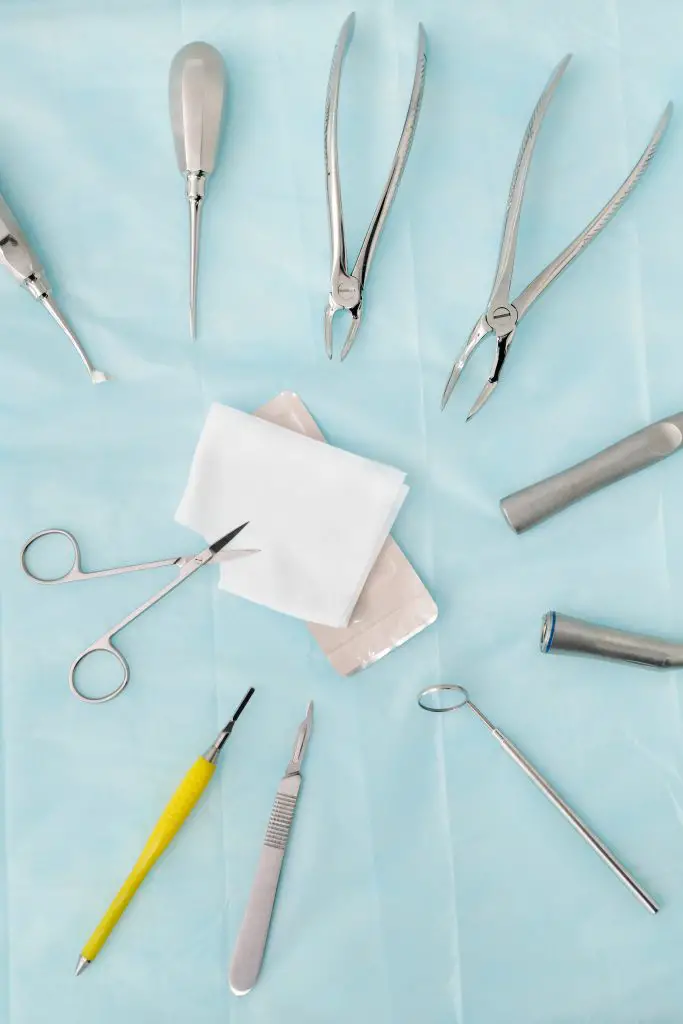(This article (Medium clinic requirements in Ethiopia) is based on the guide published by the Ethiopian Standards Agency (ESA) 2020 edition). Let’s dive into it.

room size requirements
A medium clinic in Ethiopia should have a minimum of
- Reception, recording and Waiting area with guest chairs, 16sq. m
- Patient examination room(s), 12sq. m
- Treatment/ Procedure/ Emergency room, 16
- Cabinet with lock for medical supplies in Treatment/Procedure/Emergency room,
- Delivery rooms #3: Delivery 16 sq. m, Laboring 8 sq. m & Postnatal 8sq. m
- Emergency resuscitation room with two beds 16 sq. m
- Instrument processing room 12 sq. m
- MCH room 9 sq. m
- Laboratory room, 20 sq. m
- The laboratory shall have wall mount cabinet for reagents,
- Staff room 9 sq. m,
- Toilet room with hand washing basin, (male & female), 8 sq. m
- X-ray room as per ERPA requirements(optional)
- Incinerator (mobile/fixed).
- Placental pit
And examination rooms should be
- Promote dignity and privacy of the patient.
- Easily accessible for person with disability
- Should have fire extinguisher placed in visible area
- Should have hand washing basin at patient care rooms like examination rooms, treatment room, laboratory, toilet an delivery room.
Professional needed

The medium clinic in Ethiopia shall be directed by a licensed
- General Practitioner with a minimum of 3 years of experience or
- Generic Health officer or generic BSc Nurse with a minimum of 5 years of experience or
- Nurse Practitioner or Post basic BSc nurse or Post Basic Health Officer with a minimum work experience of 3 years. These professionals shall have 2 years’ relevant work experience before joining the post basic BSc program.
A medium clinic should have at minimum the following staff.
- GP/HO/Nurse Practitioner/BSc Nurse – 1
- Nurse, Diploma – 1
- Midwife – 1
- If delivery service available BSC midwife – 1
- Lab technician or lab technologist – 2
- Radiology technologist if ultrasound service are available – 1
- Radiology technologist/ Radiographer – 1
- Receptionist – 1
- Cleaner – 1
Equipment Needed

- Diagnostic Equipment
- Stethoscope
- Ophthalmoscope
- Sphygmomanometer
- Reflex hammer
- Thermometer
- Fetosthetoscope
- Weighing scale
- Snellen`s Chart
- Infanto-meter and height scale
- Tuning fork,500 Hz
- Otoscope
- Medical Equipment
- Mobile examination lamp
- Examination couches
- Steam Sterilizer
- Refrigerator #2, (LAB & Treatment room)
- Delivery Equipment
- Neonatal resuscitation
- Delivery coach
- Instruments
- Dressing set
- Instrument
- Dressing set
- Minor surgical set
- Instrument tray
- Instrument trolley
- Delivery set
- Ear irrigation syringe
- Enema set
- Packing nasal forceps
- Specula of different sizes
- Steri-strip for steam autoclave
- Pickup forceps with jar
- Lumbar puncture set (optional)
- Sterilization drums
- IV Infusion stand
- Kidney dishes
- Others
- Tourniquet
- Kick buckets
- Drapes
- Tongue depressors
- Surgical cape
- Cabinets and shelves
- Surgical mask
- Time clock
- Emergency medicines shall be available as per emergency medicine list prepared by EFDA.
Laboratory Service
A medium clinic in Ethiopia shall have the following list of lab tests.
- CBC including ESR and blood group and RH
- Clinical chemistry
- Urine test including pregnancy tests
- Parasitology
- Bacteriology or fungal exam including gram stain, KOH, AFB Stain, Wet mount, Indian ink
- Serological tests including HBsAg, HCV, H.pylori, VDRL and HIV Ab test.
The laboratory of the medium clinic should be directed by a licensed medical Laboratory technician with 3 years of relevant experience.
Imaging services (Optional)
A medium clinic can have an X-ray or ultrasound service. But it is not mandatory. If you want to read more about it, you can read the PDF here.
What is the expected service from a medium clinics in Ethiopia?
Outpatient medical service
In general medium clinic is expected to provide outpatient care for different acute and chronic diseases. And it should have clinical protocols for the management of at least common disease entities like malaria, hypertension, and locally significant disease and also for common dental, eye, ENT, and mental health problems.
It also needs to have a list of potential referral sites with contact addresses with regular updates, referral forms, and feedback-providing mechanisms.
The medium clinic shall have a system to report diseases under national surveillance to the sub-city/woreda/town health offices.
Minor surgical service
The Medium clinic shall provide minor surgical services for the following conditions:
- Circumcisions
- Lipoma and simple cyst excisions,
- abscess drainages
- suturing of lacerated wounds
- external immobilization of closed and open fractures,
- foreign body removal and
- other minor interventions under local anesthesia
The minor surgical procedure room needs to be clean and the procedure should be done under the aseptic technique. And pain management should be given after the procedure.
The clinic is expected to have a clear protocol for minor surgical procedures and about the administration of local anesthesia and need to be recorded for each patient and documented along with the preoperative diagnosis.
The medium clinic should have a copy of management protocols at least for the following:
- Acute burn management
- Pain management
- Emergency or acute trauma management
- Emergency resuscitation (CPR)
Nursing care service
Nursing care shall be availed for patients unable to support themselves, and other clients who need the care.
24-hour Emergency service
Emergency services include
- Airway management
- Bleeding control
- Fluid resuscitation
- Cardiopulmonary resuscitation (CPR)
These services should be provided without any prerequisite and discrimination.
And also there should be protocols for initial management of at least the following emergency cases.
- Shock
- Severe bleeding
- Fracture and injuries
- Coma
- Burn
- Poisoning
- Seizure disorder
- Hypertension emergencies
- Cerebrovascular accident
- Acute diarrhea (Severe dehydration)
- Acute abdomen
- Tetanus
- Meningitis
- Severe and complicated malaria
Referral should be done after providing initial stabilization and after confirmation of the required service availability in the facility where the patient is to be referred to.
A medium clinic can provide MCH service including delivery service from SVD and should refer high-risk mothers and complicated deliveries. Assisted deliveries are prohibited in medium clinics.
Pharmaceutical service
A medium clinic should have emergency medicine at all times. But it is prohibited to hold or dispense non-emergency medicines.
If you want to know more about medium clinic requirements in Ethiopia, you can read more here.
If you want to know how to open a pharmacy in Ethiopia, clinic here.
Contact information of Ethiopian standards agency (ESA)
- 011-646 06 85, 011-646 05 65
- 011-646 08 80
- 2310 Addis Ababa, Ethiopia
- E-mail: info@ethiostandards.org
- Website: www.ethiostandards.org
